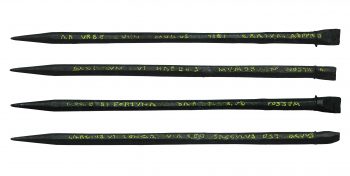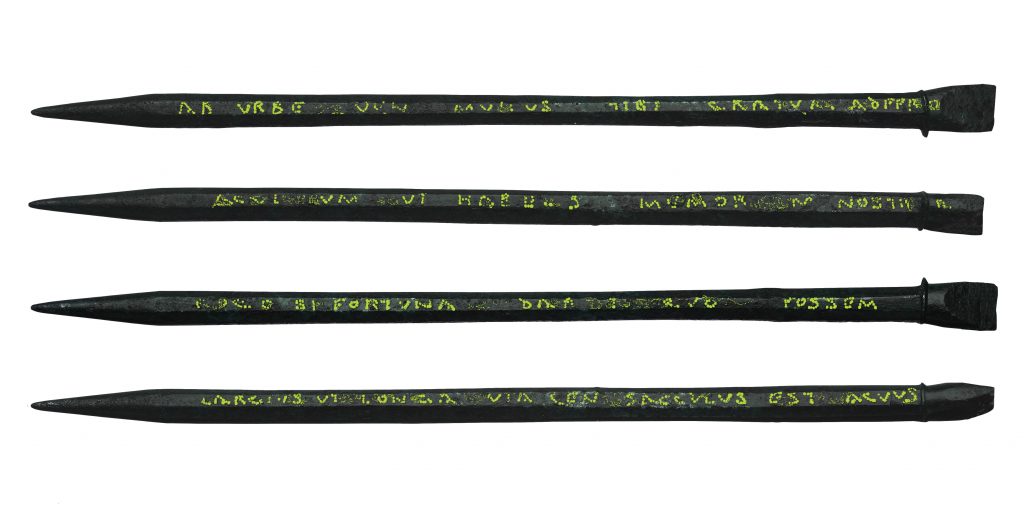Roman Pen Reveals Latin Joke Posted by Brittany Britanniae on Aug 26, 2019 in Latin Language, Roman culture
Savlete Omnes
Earlier this month, this news broke and I just had to cover it and review the Latin on the pen!
The Bloomberg dig took place between 2010 and 2014 and uncovered some 14,000 artifacts, which archaeologists are still working through including this exciting find! This stylus or pen’s inscription was exceptionally difficult to read, partly due to corrosion and is only legible due to the work by conservators.
Below is an enlarged image of the pen after it’s cleaning:
‘ab urbe v[e]n[i] munus tibi gratum adf(e)ro
acul[eat]um ut habe[a]s memor[ia]m nostra(m)
rogo si fortuna dar[e]t quo possem
largius ut longa via ceu sacculus est (v)acuus’
acul[eat]um ut habe[a]s memor[ia]m nostra(m)
rogo si fortuna dar[e]t quo possem
largius ut longa via ceu sacculus est (v)acuus’
FIRST LINE “From the city I came. I bring to you a beloved gift”
- ab+urbe = “from the city” (ab +ablative)
- veni = “I came” (venio, 1st singular perfect)
- munus (gift) +gratum(beloved) = “a beloved/welcomed gift (neuter noun munus with neuter adjectives gratum.
- tibi= “to you” (dative)
- adfero= “I bring/I carry” (affero or adfero, 1st singular present)
SECOND LINE: [a gift] that is pointed so that you may have a memory of me/ so that you may remember me/ so that you may hold* a memory of me.
- aculeatum= “sharp, pointed” (aculeatus adjective in neuter referring to munus)
- ut+habeas =” so that you may have/hold” (ut +subjunctive case of habeo [2nd sing present subjunctive] to express wish)
- mermoriam = “memory” (singular feminine accusative as the object of ut + habeas, but habeo+memoria can also mean “remember”)
- nostram= traditionally “of us/ours” BUT may refer to “me” (May be used for the poss. gen. of the first person, but it is the singular feminine accusative to refer to memoriam)
* I do enjoy the use of habeo +memoria instead of memini to express remembrance because of the play of habeo since one holds a pen
THIRD LINE: “I ask, if fortune were to allow (it) that I would be able to [give implied]”
rogo = “I ask” (rogo, 1st person singular)
si fortuna = “If fortune” (si + imperfect subjunctives is a conditional clause PRESENT CONTRARY-TO-FACT CONDITION – often seen with “were” in protasis/”would” in apodosis)
dar[e]t= ” were to allow, permit” (do, 3rd person singular imperfect)
quo possem = “that I would be able to” (possum, 3rd person singular imperfect)
FOURTH LINE: “abundantly as the the way/road is long [and] just as my purse is empty.”
largius = “abundantly” (adverb of the adjective largus)
ut = “as” ( a causal use meaning “as” usually introducing a general statement in correspondence with the particular assertion of the principal clause)
longa = “long” (ablative feminine singular with via as an ablative description)
via = “the way” (ablative feminine singular with longa as an ablative description)
ceu = “just as” (adverb)
sacculus = ” a purse[presumably my purse]” (singular nominative masculine of sacculus)
est = “is” (3rd person singular of sum; verb “to be”)
(v)acuus’ = “empty” (singular nominative masculine referring to sacculus)
Most translation from reported news articles:
“I have come from the City. I bring you a welcome gift with a sharp point that you may remember me. I ask, if fortune allowed, that I might be able (to give) as generously as the way is long (and) as my purse is empty.”
In other words: I’m broke, but here’s a pen.
I hope you have enjoyed the article and look forward to everyone’s thoughts and comments as well as collaborative notes and ideas on the translations.

Keep learning Latin with us!
Build vocabulary, practice pronunciation, and more with Transparent Language Online. Available anytime, anywhere, on any device.







Comments:
A G Maxwell:
The bearer of the gift knows the receiver would value the writing istrument. Both of them might have been exchanging confidences. A stylus is something very personal, private, close, an extension of your fingers, hand that holds out. The acuteness can imply sharp, painful, sweet shared moments which can jog the memory. The writing will be inked wet but will dry up, ‘scripta manebunt’, sicca non erit memoria.